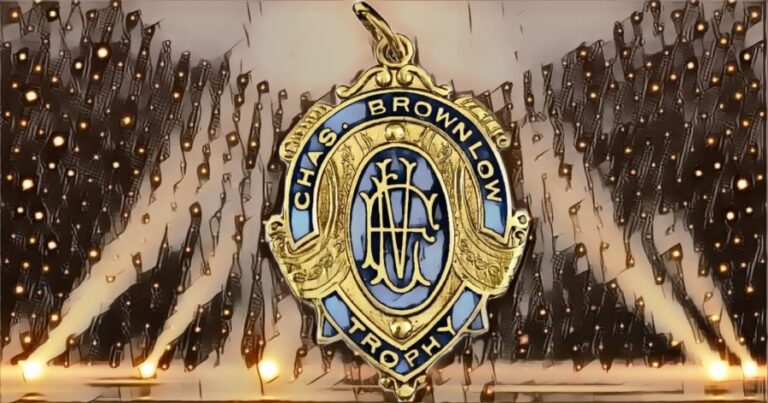As we prepare for footy’s night of nights, Jimmy Ayres takes the time to dive into the game’s history and uncover the story behind the man behind the medal.
Charles Brownlow Trophy
Known for eternum as the Brownlow Medal, and commonly referred to in more contemporary settings as the ‘Charlie’, the Chas Brownlow Trophy may be a medal abnormally small in stature, but its tremendous standing within the game transcends any other award. Renowned as the AFL’s most prestigious individual honour since its inception in 1924, the Brownlow Medal is voted upon by the adjudicating umpires from each match, awarding players a 3-2-1* in votes, which are compiled and counted at the end of the home and away season.
The Brownlow Medal has found itself adorned around the necks of more legends and larger-than-life figures within our sport than I care to list. Likewise, the medal has become a popular point of contention when discussing the greatest players of all time, who were never lucky enough to secure one. The level of prestige in winning a Brownlow is equalled by no other award, to the point where even the most casual of football fan would be able to name past winners of the award with relative ease.
One thing that not so many people do know, however, is just who was Charles Brownlow?
It’s hard to make a comparison of Charles Brownlow to someone more recognisable to most in today’s era of recency bias, especially given that most of his hard work was contributed more than 100 years ago. But from my extensive research, if you could imagine a bloke with the playing skills and all-round game knowledge in his early days of a Leigh Matthews, the ingenuity and genius for the betterment of the game as a whole of a Kevin Sheedy, the administration work and behind-the-scenes string-pulling of an Allen Aylett, and the publicity and promotional bravado and excellence of an Eddie McGuire all rolled into one, then you would be on the right track.
Upon his death at age 62 in 1924, Brownlow was remembered right back to his schooling days as having a quiet and courteous demeanour along with a strong, manly bearing both in the classroom and on the playground, traits that remained a part of his character until the day he died.
After leaving school, Charles took up an apprenticeship as a watchmaker where his penchant for management became obvious, as he soon took over as business manager and went on to promptly opening his own jewellery store.
Seemingly succeeding in every venture he would be a part of, Brownlow was affiliated with many sporting clubs from Australian football, to cricket, to rowing, but it was the former where the legendary Geelong figure would become most renowned.
Under the strict rule of his disciplinarian father, Brownlow would play senior football under the alias of Charles Green, in a bid to hide his extracurricular activities from his no-nonsense fathers who staunchly disapproved of his son’s passion for sport.
With a pronounced football career developing in the VFA (Victorian Football Association) during the 1880’s as a premiership-winning captain for Geelong, Brownlow established his reputation as a fair and skilled player, and a leader of the highest esteem both with his own teammates, and those who opposed him.
After hanging up the boots as a player, Brownlow transitioned seamlessly into numerous administrative roles in various sports and standings, such as Geelong’s football secretary from 1985 until his untimely death in 1923, official delegate from Geelong to the VFL board for over 20 years, VFL’s Vice President and registered delegate to the Australasian Football Council for six years, chairman of the Umpires Committee for almost 12 years, President of the Australasian Football Council,
What most fail to understand is the significant role played by Brownlow in establishing the VFL. The League would issue the following announcement: “no one, at any time, has been more worthy of the highest distinction it is in the power of the league to confer”.
It’s safe to say that still to this day, there would only be a very select handful of personalities that could lay claim to having had as much influence on the standing of the game and the successful position in which it stands, as Charles Brownlow. Barassi would be up there – reverence of the highest order from the people who run the game.
It was a mere five weeks after his untimely passing at age 62 after a battle with illness, that a unanimous decision was made by the Victorian Football League to strike a gold medal and name it in Brownlow’s honour, to perpetuate the name of the late, great Charles Brownlow, and to commemorate his lifetime of dedication and service for the betterment of the game of Australian football.
Like this free content? You could buy Jimmy a beer, or a coffee, or something to trim his nasal hair as a way to say thanks. He’ll be a happy camper.


